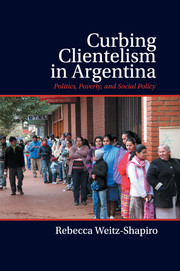Book contents
- Frontmatter
- Contents
- List of Illustrations
- List of Tables
- Acknowledgments
- 1 Accountability, Democracy, and the Study of Clientelism
- 2 Making Clientelism Work: Politician Behavior and Voter Beliefs
- 3 Curbing Clientelism: Why Some Politicians Opt Out
- 4 Clientelism, Social Policy, and Measurement
- 5 Clientelism across Municipalities in Argentina's National Food Security Program
- 6 Survey and Experimental Evidence for the Costs of Clientelism
- 7 Moving Toward Accountability? Comparative Perspectives and Policy Implications
- References
- Author Index
- Subject Index
1 - Accountability, Democracy, and the Study of Clientelism
Published online by Cambridge University Press: 05 October 2014
- Frontmatter
- Contents
- List of Illustrations
- List of Tables
- Acknowledgments
- 1 Accountability, Democracy, and the Study of Clientelism
- 2 Making Clientelism Work: Politician Behavior and Voter Beliefs
- 3 Curbing Clientelism: Why Some Politicians Opt Out
- 4 Clientelism, Social Policy, and Measurement
- 5 Clientelism across Municipalities in Argentina's National Food Security Program
- 6 Survey and Experimental Evidence for the Costs of Clientelism
- 7 Moving Toward Accountability? Comparative Perspectives and Policy Implications
- References
- Author Index
- Subject Index
Summary
Stepping off the bus on the main road in Campo Santo, a small, impoverished municipality in Argentina's northwest, it is not difficult to find the town's social welfare office. The office is prominently located near the main entrance to the municipality and, more importantly, identifiable by the sizable crowd of residents waiting outside. The crowd is made up mostly of women, many with small children, joined by a few elderly men. Various staff members from the social welfare office are present, but only a top bureaucrat in the office, Liliana, actually attends to the crowd. The type of requests residents make vary widely: as I arrived on one occasion, an older man asked for help paying for a prescription, while later in the morning a mother came by to pick up a mattress she had recently requested so that her daughter could move out of their shared bed.
These benefits, along with others that Liliana distributes, are funded by the government – municipal, provincial, or federal. However, the treatment beneficiaries receive in Campo Santo is both personal and politicized. Liliana's desk is crowded with photos of herself with the mayor, the governor, and the lieutenant governor. Above her chair hangs a hand-drawn portrait of Juan and Eva Perón, the icons of Argentina's largest political party, the Partido Justicialista (PJ), to which both Liliana and the mayor belong.
- Type
- Chapter
- Information
- Curbing Clientelism in ArgentinaPolitics, Poverty, and Social Policy, pp. 1 - 25Publisher: Cambridge University PressPrint publication year: 2014



